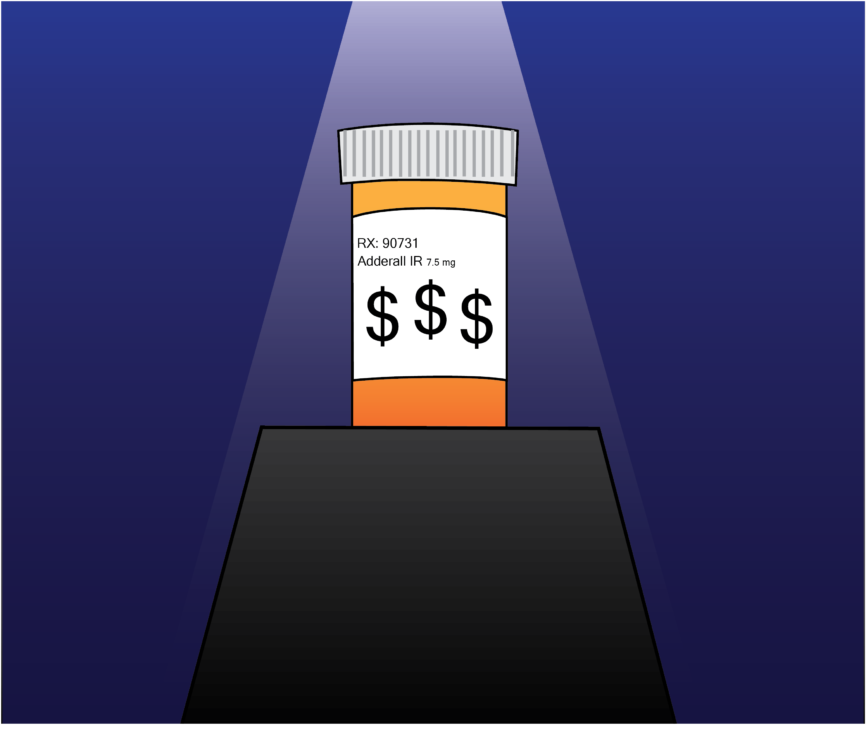The UVSS health care plan is based on the politics of austerity, not need

For many of us with ADHD, thinking about our affliction is something we don’t spend much time on. Our brains are too active trying to sift through constant streams of competing stimuli — and besides, everybody thinks we’re normal anyway, maybe just a bit “zany.”
In many ways, ADHD is an invisible affliction — and when it is recognized, it is often minimized or dismissed. The devastating results of such a narrative can be seen in the muted silence on the part of successive student governments over the UVSS’ healthcare providers decision to remove ADHD medications from coverage.
The invisibility and subsequent minimization of ADHD is often a product of its symptoms. Impulsivity? People see a lack of self-control. Outbursts? Temperamental or angry. Disorganization and procrastination? Lazy. Living with ADHD means being unfairly labeled with these stereotypes.
But ADHD is far more serious than these stereotypes suggest.
Research on ADHD suggests that if left untreated, individuals with the disorder are at a much higher risk of substance abuse, driving accidents, and risky sexual activity. People with ADHD tend to have lower academic performance and to find themselves in lower income professions. As a result, people with ADHD often have a severely impacted quality of life manifesting in lower life expectancies and higher poverty rates.
If you have ADHD and you’re in university, you’re one of the lucky ones. You probably came from a middle-class family and received the testing, counselling, and medication required to succeed — all of which require having the means to pay for treatment.
A psychoanalysis for ADHD runs from around $2 400 to 3 000, and is not covered by provincial medicare. ADHD medication is costly, with the average cost of Adderall (the most commonly prescribed ADHD drug) running $113 per month. ADHD treatment is a medical necessity, and these costs are prohibitive for many families seeking treatment.
Despite these high costs, common ADHD drugs are not covered by the UVSS’s healthcare provider Studentcare. Despite the broad coverage for other classes of prescription drugs, students are still expected to pay out-of-pocket for many medications used to treat ADHD. As recently as 2016, these medications were covered, but they have since been removed without notice.
When asked at the most recent UVSS Board of Directors meeting on April 6 how this decision was made, UVSS Director of Finance Dakota McGovern replied with his “best guess.”
“All of the different medications are covered up to $2 000 according to the B.C. drug formulary … the only way I could see medications being removed was if it was removed from the formulary,” McGovern said.
Upon further research, I discovered that the B.C. government likely followed the advice of a 2016 report by the Drug Benefit Council that advocated withholding the most common ADHD medications from the Regular Benefits designation, as the “estimated total budget impact would be approximately $122.5 million over three years.” All of the arguments of the report were prefaced on concern for cost.
Is this really an appropriate way to determine which students receive drug coverage? Students with ADHD are penalized relative to other students with mental health disorders, seemingly because of the wide prevalence of ADHD and the high cost of medication. Shouldn’t we aim for a school medication policy that enables all students to reach their full potential?
While StudentAid BC does provide some grants for students for disabilities — for which ADHD qualifies — the stringent documentation required to receive these grants comes down to a student’s past ability to afford expensive testing, medical documentation, and specialist reports. In my experience, the students who receive this grant largely come from privileged backgrounds, where they had the money and support to ensure a measure of success in the first place.
While it is not the fault of the UVSS that the B.C. government has decided who should get drugs and who shouldn’t based on cost concerns, we shouldn’t let University of Victoria students fall through the cracks. Access to these medications can make or break a student’s academic career. In the absence of the introduction of universal pharmacare on the provincial or federal level, the UVSS should fight to ensure the next student coverage contract covers all ADHD medications.
With the onset of the COVID-19 pandemic, many of the structures that students with ADHD had put in place to stay organized have collapsed overnight. Having to worry about how to pay for essential medication should not be one more concern.
Students with ADHD are marginalized enough already. The UVSS should be fighting that marginalization, and making it known to their healthcare provider and the provincial government that the politics of austerity are best left out of decisions regarding drug coverage critical to students’ well-being.






